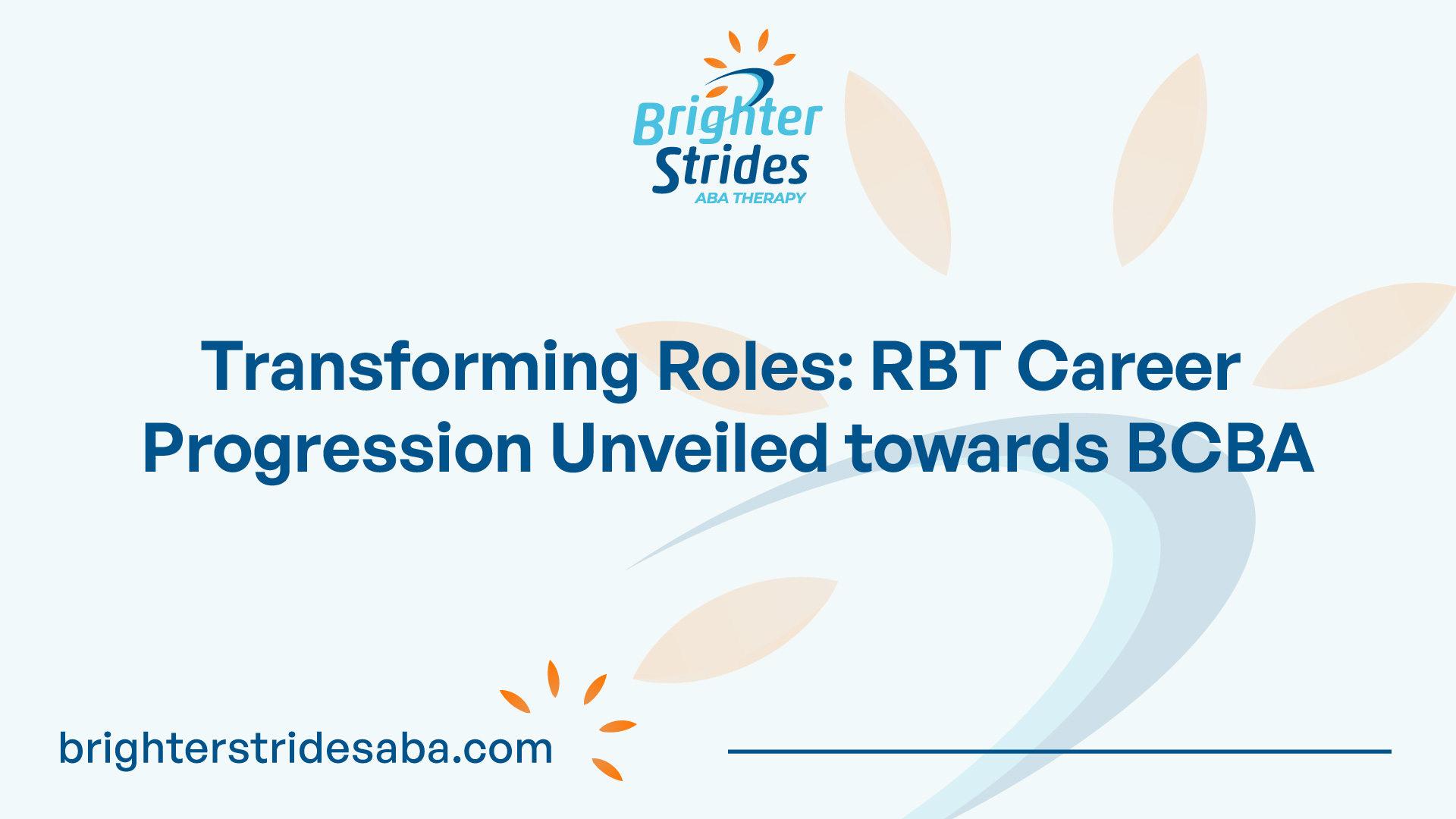RBT Career Progression
Registered Behavior Technicians (RBTs) play a vital role in the field of Applied Behavior Analysis (ABA) by working closely with individuals with autism or other developmental disorders to implement behavior intervention strategies.
They provide direct support and assistance to clients, helping them acquire new skills, reduce challenging behaviors, and improve their overall quality of life. RBTs collaborate with BCBA supervisors, parents, educators, and other professionals to provide comprehensive and effective behavioral interventions.
To pursue a career as an RBT, individuals need to complete a 40-hour training course, pass a competency assessment, and hold a high school diploma or equivalent. RBTs typically provide services in various settings such as homes, schools, clinics, or community-based programs.
RBTs gain valuable experience working directly with clients, which serves as a foundation for further professional development and advancement, such as becoming a Board Certified Behavior Analyst (BCBA). The opportunities for advancement for RBTs are diverse and can lead to rewarding careers within the field of ABA.

The Role of Registered Behavior Technicians (RBTs)
As an entry-level professional in the field of ABA, RBTs work under the supervision of BCBAs and provide direct implementation of behavior intervention plans, data collection, and support for individuals with behavioral needs. They work hands-on with clients, assisting them in acquiring new skills and reducing challenging behaviors.
RBTs play a crucial role in the successful implementation of behavior intervention strategies, working collaboratively with a multidisciplinary team to achieve positive outcomes for their clients.
Opportunities for Advancement
While RBTs have a rewarding role, many professionals aspire to advance their careers and take on more responsibilities. Advancement opportunities for RBTs include pursuing higher education, moving into supervisory and leadership roles, specializing in autism consulting and advocacy, pursuing research and academia, or even starting their own entrepreneurship and private practice.
These career paths provide RBTs with the chance to make a greater impact in the field of ABA and expand their knowledge and skills.
Advancing from an RBT to a BCBA is one of the most common and highly regarded career progressions, offering increased job opportunities, higher salary potential, and the ability to take on more complex cases.
By gaining valuable experience and continuing their education, RBTs can open doors to new possibilities and make a significant difference in the lives of individuals with developmental disabilities.
Becoming a Board Certified Behavior Analyst (BCBA)
For Registered Behavior Technicians (RBTs) looking to advance their careers in the field of applied behavior analysis (ABA), becoming a Board Certified Behavior Analyst (BCBA) is a common and rewarding path.
BCBAs are behavior therapists with a graduate-level certification who assess individuals’ behavioral issues and develop treatment strategies for improving targeted behaviors. They work with individuals of all ages in various settings, with education and healthcare being the most common industries for the profession.
BCBA Certification Requirements
To become a BCBA, RBTs must meet specific certification requirements. These requirements typically include:
- Education: RBTs must possess a minimum of a master’s degree in a behavior analysis-related field. The degree program must be accredited by the Behavior Analyst Certification Board (BACB) or meet specific coursework requirements determined by the BACB.
- Supervised Experience: RBTs must complete a specified number of supervised fieldwork hours, typically ranging from 1,000 to 1,500 hours, depending on the program and educational background. These hours involve hands-on experience working directly with individuals and implementing behavior analysis interventions.
- Passing the BCBA Exam: RBTs must pass the BCBA certification exam administered by the BACB. The exam assesses knowledge and skills in behavior analysis, including assessment, intervention, ethical considerations, and professional conduct.
- Ethics Training: RBTs must complete a course in ethics as outlined by the BACB.
It’s important for RBTs aspiring to become BCBAs to review the specific certification requirements set forth by the BACB, as these requirements may vary or be subject to updates.
Responsibilities of BCBAs
BCBAs have a broader scope of responsibilities compared to RBTs. Their role includes:
- Conducting Assessments: BCBAs perform comprehensive assessments to evaluate individuals’ behavior and determine the most effective treatment strategies.
- Designing Treatment Plans: Based on assessments, BCBAs develop behavior intervention plans tailored to individuals’ needs. These plans outline specific goals and strategies for behavior modification.
- Training and Supervision: BCBAs provide training and supervision to RBTs and other professionals involved in implementing behavior intervention plans. They ensure that interventions are carried out correctly and consistently.
- Monitoring and Analyzing Data: BCBAs establish data collection systems to track individuals’ progress and make data-driven decisions regarding treatment strategies. They analyze data to assess the effectiveness of interventions and make necessary adjustments.
- Communicating with Stakeholders: BCBAs maintain regular communication with individuals, families, caregivers, and other stakeholders involved in the treatment process. They provide progress updates, address concerns, and collaborate to ensure the continuity and effectiveness of treatment.
By becoming a BCBA, RBTs can take on more advanced roles in the field of autism treatment, conduct assessments, design and implement behavior intervention plans, supervise other professionals, and communicate progress or changes in treatment strategies with stakeholders. BCBA certification opens up opportunities for increased job prospects, higher earning potential, and the ability to work independently or in supervisory positions.
The Benefits of Advancing from RBT to BCBA
Advancing from a Registered Behavior Technician (RBT) to a Board Certified Behavior Analyst (BCBA) can bring numerous benefits, both in terms of career growth and personal development. Let’s explore two significant advantages of pursuing this career progression: higher salary potential and expanded job opportunities.
Higher Salary Potential
One of the key incentives for RBTs to become BCBAs is the potential for a higher salary. According to Cross River Therapy, RBTs can potentially earn a six-figure salary, especially with additional certifications and licenses, such as becoming a BCBA. The average salary for an RBT in the United States is around $36,218 per year, while the average salary for a BCBA is approximately $68,554 per year. It’s important to note that salaries may vary based on factors such as location and years of experience.
By becoming a BCBA, RBTs can significantly increase their earning potential. This upward trajectory in salary is a result of the advanced knowledge, expertise, and responsibilities that come with the BCBA certification. It’s worth mentioning that the demand for trained and certified RBTs and BCBAs has increased dramatically in recent years, according to the Bureau of Labor Statistics. This growing demand further contributes to the potential for higher salaries in the field.
Expanded Job Opportunities
Advancing from RBT to BCBA opens up a wider range of job opportunities. As a BCBA, individuals can take on more specialized roles and responsibilities in the field of applied behavior analysis. BCBAs are qualified to design, implement, and supervise behavior intervention programs, provide behavior analytic assessments, and oversee the work of RBTs and other professionals.
With the BCBA certification, professionals may find employment in various settings, including schools, clinics, hospitals, research institutions, and private practices. The demand for BCBAs has been increasing steadily, with a significant growth of 5,852% between 2010 and 2021. This trend indicates a favorable job market for individuals who hold this advanced certification.
The expanded job opportunities that come with becoming a BCBA allow professionals to explore different areas of expertise and make a meaningful impact in the field of applied behavior analysis. This career progression provides RBTs with the chance to further develop their skills, take on leadership roles, and contribute to the betterment of individuals with autism and other developmental disabilities.
Advancing from an RBT to a BCBA offers not only financial rewards but also personal and professional growth. The higher salary potential and expanded job opportunities make this career progression a compelling choice for those seeking to further their careers in the field of applied behavior analysis.
Alternative Career Paths for RBTs
While becoming a Board Certified Behavior Analyst (BCBA) is a common career progression for Registered Behavior Technicians (RBTs), there are several alternative paths that RBTs can explore within the field of autism treatment. These paths allow RBTs to expand their knowledge, skills, and impact in different ways. Here are some of the alternative career paths for RBTs:
Pursuing Higher Education
RBTs can choose to pursue higher education in fields such as psychology or special education. By obtaining a degree, RBTs can enhance their understanding of the theories and principles that underpin Applied Behavior Analysis (ABA) therapy. This knowledge can help them better analyze behavior, develop effective intervention plans, and collaborate more effectively with other professionals in the field.
Supervisory and Leadership Roles
RBTs can also explore supervisory and leadership roles within the field of autism treatment. This can involve transitioning to a Senior RBT position or taking on responsibilities such as training and mentoring other RBTs. These roles allow RBTs to expand their impact by guiding and supporting other RBTs in their professional growth and development.
Autism Consulting and Advocacy
Another alternative career path for RBTs is to work as an autism consultant or advocate. As a consultant, RBTs can share their expertise with a wider audience and provide guidance and support to families, schools, and organizations working with individuals on the autism spectrum. Advocacy, on the other hand, involves working with organizations, participating in campaigns, and raising awareness to shape public opinion and influence legislation. Both consulting and advocacy roles allow RBTs to make a meaningful difference in the field and contribute to the betterment of autism treatment and support.
Research and Academia
RBTs who have a passion for research and a desire to contribute to the field can pursue careers in research and academia. This path allows RBTs to engage in autism research studies, contribute to the development of evidence-based practices, and teach and mentor future RBTs. By working in research and academia, RBTs can have a significant impact on advancing the field of ABA and autism treatment.
Entrepreneurship and Private Practice
For RBTs who have an entrepreneurial spirit, starting their own business or private practice can be a fulfilling alternative career path. This allows RBTs to provide specialized services to individuals with autism, such as offering consultation, workshops, or creating their own autism services business. Entrepreneurship and private practice provide RBTs with the opportunity to share their expertise, make a difference in the lives of individuals on the autism spectrum, and have more control over their professional journey.
By exploring these alternative career paths, RBTs can continue to grow professionally, expand their skill set, and make a positive impact in the field of autism treatment. Whether through pursuing higher education, taking on leadership roles, engaging in research, or venturing into entrepreneurship, RBTs have numerous opportunities to contribute to the well-being and development of individuals with autism.
Registered Behavior Technicians (RBTs) play a crucial role in the field of Applied Behavior Analysis (ABA). While Board Certified Behavior Analysts (BCBAs) and other professionals are responsible for designing and overseeing treatment plans, RBTs are the ones who implement these plans directly with individuals.
RBTs work closely with individuals with autism and other developmental disabilities to help them learn new skills, reduce challenging behaviors, and improve their quality of life. They use techniques such as positive reinforcement, prompting, and shaping to teach new behaviors and reduce problematic ones.
Compared to BCBAs, RBTs typically have less formal education and training. However, they undergo rigorous training programs that include hands-on experience working directly with individuals under the supervision of a BCBA or other qualified professional. This training ensures that RBTs have the knowledge and skills necessary to effectively implement behavior intervention plans.
Despite their lower level of formal education compared to BCBAs, RBTs play an essential role in the field of ABA. They provide direct support to individuals with autism and contribute significantly to their progress towards achieving treatment goals. Without RBTs, the design and implementation of behavior intervention plans by BCBAs would not be possible.
Conclusion
In conclusion, pursuing a career in Applied Behavior Analysis (ABA) can be a rewarding and fulfilling choice for individuals who have a passion for helping others and making a positive impact. Registered Behavior Technicians (RBTs) play an essential role in this field, providing direct support to individuals with autism and other developmental disabilities. By undergoing rigorous training programs and working under the supervision of Board Certified Behavior Analysts (BCBAs), RBTs acquire the knowledge and skills necessary to effectively implement behavior intervention plans.
For those seeking to further their careers in ABA, becoming a BCBA offers numerous benefits, including higher salary potential, expanded job opportunities, and increased responsibilities. However, there are also alternative career paths available for RBTs who wish to explore different areas of expertise or make an impact in other ways.
Regardless of the path chosen, professionals in the field of ABA have the opportunity to make a significant difference in the lives of individuals with autism and other developmental disabilities. The demand for trained and certified RBTs and BCBAs is growing rapidly, indicating a promising future for those entering this field.




